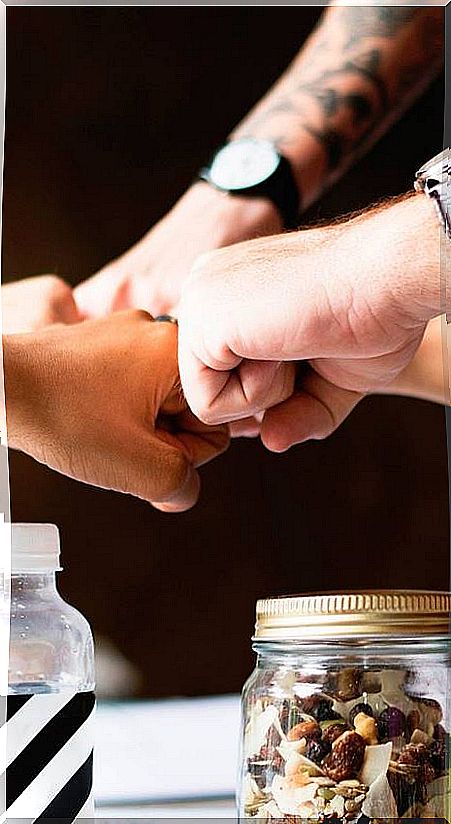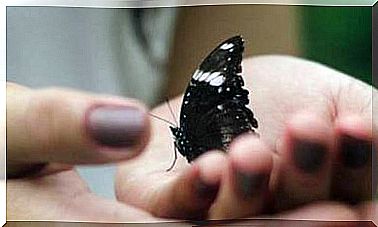Less Ego And More Open To Others
We are sociable by nature, but we are trapped in the fence of individualism. We need to know ourselves internally to open our hearts, seek empathy and the good of all.

Enjoying a vast network of relationships makes us feel more secure and confident in the face of everyday challenges, happier, less depressed and, eye to the fact, more resistant to diseases, according to studies such as the one carried out by the psychologist Sheldon Cohen, from Carnegie Mellon University.
Cohen asked men and women to write down all their contacts over the course of fifteen days, classifying them into twelve categories: neighbors, parents, partner, friends … Then he exposed these people to the cold virus and among those who had a smaller circle of relationships a 62% developed colds, compared to 35% of those who had relationships in six or more categories.
The study indicated that one reason for better immunity was that the diversity of social networks introduced a “wellness factor” that increased the immune system’s ability to defend itself against the virus.
In other words, sixteen family members will not bring us as much as five family members, two close friends, three less close friends, four co-workers, and two neighbors.
If deep down we suspect this and if contact with others makes us feel more integrated, accepted, valued and loved, why is it so difficult for us to have enriching relationships and open our vital circle to new experiences?
Escaping the traps of ego and individualism
Often our interactions with others are a tug of war between selfishness and altruism, sociability and unsociability, competitiveness and collaboration, closeness and remoteness. This sets up a network of feelings that are sometimes minimally adjusted and others are completely out of adjustment, as José Antonio Marina affirms in his book Anatomy of fear.
This happens because we are part of a culture in which the individual is more important than the group and in which the ego-based personality is fostered: independent, narcissistic, dominant, tough, competitive, aggressive …
Other cultures, such as the Japanese, give more priority to the community, and the type personality is dependent, humble, flexible, not aggressive, more considerate of the other. Proof of this was the reaction of the Japanese people to the Fukushima catastrophe: there were no cases of looting, but there was a remarkable self-denial.
This individualistic and competitive cultural pattern with which we must deal with since we are born in the West determines many of the factors that influence the construction of our identity and way of relating.
If we were loved, recognized and supported by the important figures of our childhood (parents, educators, colleagues …) and we grew up with good self-esteem, possibly it is easier for us to perceive the world as a friendly environment and we dare to relate without fear of being wrong . But what happens when we do not love ourselves, when shyness immobilizes us, when we feel less than others?
Why do we associate with the wrong people?
Mercè Conangla and Jaume Soler explain that when a person has wrong beliefs about himself, does not know himself well and does not know what he needs and wants, he tends to relate to people who compensate for their emptiness and their areas of insecurity, who solve their conflicts internal and are aware of their needs. If the chosen person also feels insecure and incomplete, then a “toxic” relationship can be established that blocks the development of the two.
A common link when self-esteem is low is dependency. Thus, when a person’s need for someone to accept them prevails over the need to be respected, it is easy for them to adopt a submissive role, in which they follow the dictates of others. Another possibility would be to consider the “savior” of the other, which leads to surrender without measure or receive anything in return. At some point the balance becomes unbalanced and frustration ensues for both parties.
The possessiveness is one of the great scourges in personal relationships. It consists in believing that the other person belongs to us exclusively, which breaks the principles of freedom and respect that should govern any healthy relationship.
Likewise, there are people who establish with other commercial relationships (prioritizing economic, social or professional interest) or relationships based on competition or the fight for who exercises power. This usually generates envy or anger more or less conscious of those who do not own what the other exhibits (a brand new car, an attractive partner, money in abundance …), which fuels anxiety and destructive feelings.
On other occasions, someone who has suffered the painful breakdown of one or more relationships protects themselves by cutting their losses and thereby blocks the possibility of establishing new ties.
How are we in our relationships?
When our vital circle narrows, we can sometimes discover ourselves excessively proud and distant, as if we somehow placed ourselves above good and evil; or insignificant, as if we could hardly contribute anything to the world.
Or perhaps the problem is laziness when it comes to establishing relationships, since relating means being willing to offer and involves effort and dedication.
Observing from the heart how are the relationships that we maintain with ourselves and others, seeing if they are fluid or not, is the first step to leave the position of passive object and become an active subject, taking control of our own life, as the psychotherapist Isabelle Filliozat points out in her book Los otros y yo.
According to Isabelle, “we need to be aware of our strengths and weaknesses, accept ourselves as we are, show ourselves to others without camouflaging ourselves, express our emotions and what we disagree on, trying to negotiate and find a solution with the other person, feeling equal. “.
Be yourself and follow your personal projects
Filliozat argues that this step is easier when you have a personal project that allows you to get out of passivity and help each person make their own way. It may be helpful to attend a professional skills training course or a specially motivating inner growth workshop. It is also appropriate to adopt a vital purpose.
Mercè Conangla and Jaume Soler call this transition from object to subject “principle of personal autonomy,” and they affirm that by being governed by it it is possible to have to pay some tribute, since “we are no longer easy to manipulate and sometimes our decisions are not understood and not liked, so there may be someone who banishes us from their lives for not following their slogans. But if we give up our personal development project to please others and do not face the conflicts that arise, we will be the ones ourselves. that we will have condemned ourselves to exile and that is the most terrible thing that can happen to us. “
7 strategies to connect with other people
Once we adopt the right emotional attitude we can venture out to others. To do this, you can try these strategies:
- Show positive signs. The gestures, the tone of the voice, keeping the gaze in the other’s eyes and what our body says are as important signals as words when relating to someone. Taking care of your appearance and showing an open, smiling and friendly attitude, in which attention and respect prevail, opens many doors.
- Feel the same. Treating others as equals, neither from a higher nor lower position, contributes to their having a positive view of us.
- Invite home. Cleaning the house, ordering it and entertaining with the best food we can are signs that announce that we care about others.
- Give and know how to receive. By offering and receiving gifts and favors alike, neither party suffers. If one always receives it may feel undervalued, while one who always gives may feel uncompensated.
- Not too close, not too far. Just as the Sun and the Earth are kept at a convenient distance so that life can occur, it is advisable not to harass friends by constantly claiming their presence or forgetting about them for long periods of time.
- Making new friends. Social networks, joining a gym, a hiking center, a therapeutic workshop or anything else that motivates, allows you to meet people with hobbies that converge at some point with your own.
- Cultivate enthusiasm and empathy. Being enthusiastic in relationships brings a breath of fresh air to others. If we are also able to listen fully, appreciating not only how the other person says things but also what they feel, we can be empathetic, understanding what is happening and helping with kindness and without making judgments.
Kindness brings us closer to others
One of the most powerful practices for expanding our life circle, especially when we recognize our personal autonomy and direct the course of our existence, is kindness. To understand that the person in front of us is a human being just like us, who at some point in his life has been vulnerable (he has experienced sadness, pain, disappointment, anger, confusion …) and to wish him health, affection, relationships that fulfill him and happiness, it will generate a stream of empathy and compassion that will enlarge our hearts and make us enjoy deeper and more authentic friendships.
This positive current, always from humility and from true listening and consideration towards the other, will gradually achieve that society gains more and more a critical mass that is governed by the common good and love, no longer only towards its fellow men. , but towards all manifestations of life.









